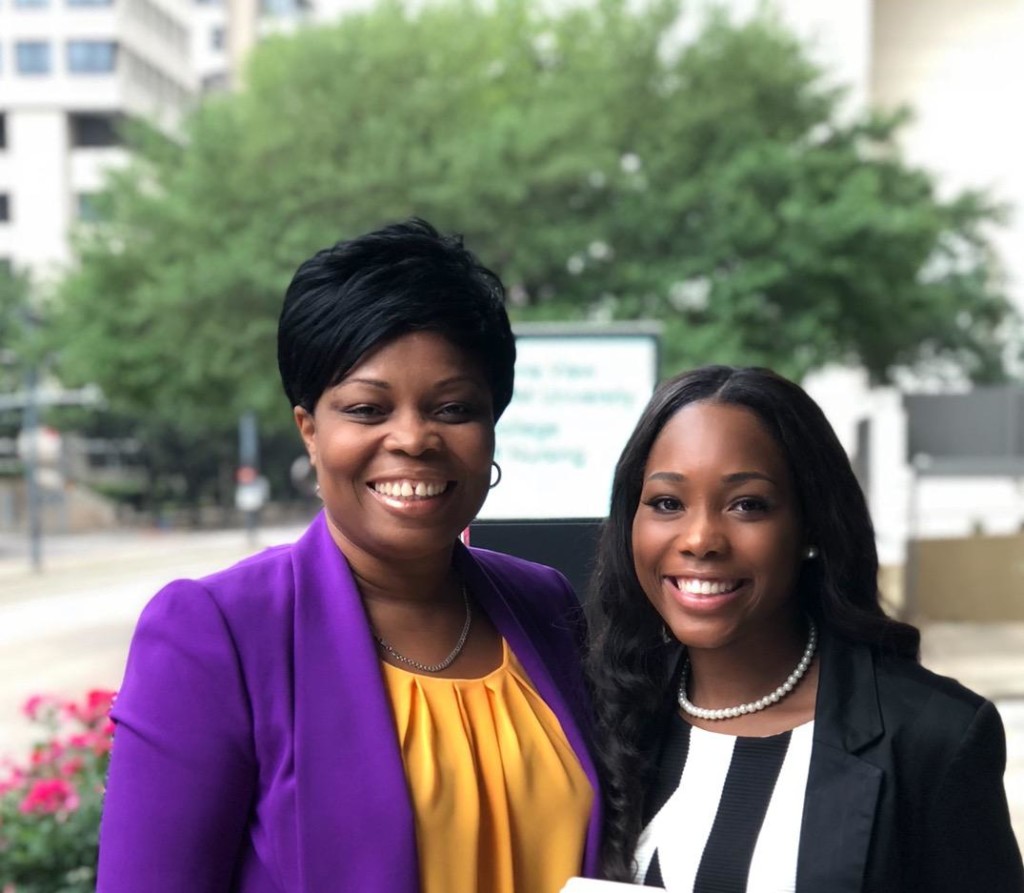PRAIRIE VIEW, Texas (October 9, 2020) – Andrea McDonald, Ph.D., a native Jamaican, never dreamed she would earn a college degree, let alone three. She was born to loving parents, who were teenagers with limited education. Despite her parents’ educational experiences, they taught the idea that having a good education would be most important to a successful career. With their encouragement, and her hard work, McDonald joined Prairie View A&M University (PVAMU) as a first-generation college student 20 years ago.
McDonald earned a bachelor’s degree in nutrition, food, and dietetics in 2007 and a master’s degree in human sciences with a concentration in nutrition in 2009 from PVAMU and a Ph.D. in health education from Texas A&M University. “Because I have achieved so much from this university, the least I can do is to give back to the younger generation,” she said.

Pictured: McDonald along with her daughter Olivia Johnson-Hopkins outside of the PVAMU College of Nursing.
Part of that younger generation includes her own daughter, Olivia Johnson-Hopkins. McDonald followed her parents’ example by teaching her daughter the value of a good education. Johnson-Hopkins recently graduated with a Bachelor of Science degree in nursing. She is now working as a registered nurse in the Texas Medical Center. “She credits the majority of her success as a registered nurse to Prairie View A&M University’s College of Nursing,” McDonald said. Next up for Johnson-Hopkins is pursuing a master’s degree and ultimately opening a clinic in rural Texas as a family nurse practitioner.
Mother and daughter both thrived as undergraduates at PVAMU in large part to the family atmosphere they felt. It also helped that Johnson-Hopkins was practically raised on the campus. “She attended classes at PVAMU since she was five years old while I was completing my undergraduate degree,” said McDonald. “She is my only child, and I raised her as a single mother.”
Today, McDonald teaches both undergraduate and graduate courses. Within the undergraduate college, she is a professor of public and community health, and community health planning and assessment; at the graduate level, she teaches epidemiology, environmental nutrition, and community health. Her employment at PVAMU began in 2006, when she was an undergraduate research assistant and then a research coordinator. After earning a Ph.D., she rejoined PVAMU as an adjunct instructor in the College of Agriculture and Human Sciences, where she taught research in nutrition, food preparation management, and foodservice systems.
For McDonald, returning to PVAMU to teach was an easy decision because of her deep connection with the university. Ever since her first days on campus, she felt welcomed by the friendly environment. “It felt as if I was at home away from home,” she said.
McDonald has fond memories of her instructors’ open-door policies and commitment to motivating students. “I can give credit to several professors who have gone home to be with the Lord and some that are still here today. Like Dr. Sharon McWhinney, my mentor; Miss Evelyn McGinty, my first advisor; Dr. Richard Griffin, who was my very first instructor on this campus; Dr. Alfred Parks, who always supported the organizations where I led as president; and Miss Barbara Dixon, who died last month; she was my motivator,” McDonald said.
She discovered her passion for teaching at age 18, while volunteering in an elementary school. Watching children become absorbed in the material she presented was an enriching experience, and she wanted to do more. This experience, combined with her lack of quality education as a child, led to her interest in making a difference in students’ lives. She became an educator because she believes teaching is the way to change society and improve future generations.
McDonald still feels the same passion for teaching today. She enjoys watching students, especially those who believe they cannot succeed in the course, grow in their academic journeys, and experience success. “My favorite part of teaching is walking in the classroom and seeing my students smiling and then passing my exams after I instill knowledge in them,” she said.
When students enter McDonald’s classroom, they find compassion, respect, and motivation, in addition to knowledge. Her collaborative teaching style goes beyond just lecturing and engages each student in discussion, often incorporating videos and games. “All of my students are different in personality and background, so on my first day in the classroom, I try to know who my students are and identify their learning style.”
She believes in the “flipped classroom” method, where she provides a scenario, and students work in small groups to discover the unknown. “I believe that sharing experiences and real-life stories are very important. For instance, COVID-19 impacts students in different ways, so students telling the stories in my class can increase knowledge,” she said.
Like other professors, McDonald has to find ways to engage and empower students during the pandemic. “Teaching during this time, for me, is challenging yet fun. I was already putting my teaching materials on a learning platform. So once COVID-19 hit, it was very easy for me to transition to online learning,” she said.
Outside of the classroom, McDonald has a long history of research. Her areas of expertise, including:
- COVID-19 and the digital divide in school
- Caribbean food culture, health issues, and school nutrition policies
- Community needs assessment and interventions
- Family influences on child health behaviors and outcomes
- Food preparation literacy, with an emphasis on chronic diseases and mental health
- Health disparities among underserved minority adolescent/youth populations
- Qualitative research methods (photo-voice and grounded theory)
- Systematic literature reviews
McDonald is also an internationally known speaker. She has delivered speeches at many conferences and seminars, including her most recent: “COVID-2019 Impacts on the Education System” and “Future Directions for African American and Latinx Youth.” Her work has earned several awards, including the Prairie View “40 under 40 Award” and “Thinking Progressively towards Public Health” from the Texas Public Health Association.
When she is not teaching or conducting research, you can often find McDonald serving on numerous campus committees. She is part of the University Undergraduate Council, Undergraduate Research Council, and she is the curriculum chair for the Department of Health and Kinesiology. McDonald is also the primary advisor for Eta Sigma Gamma, National Health Honorary Society, and the PVAMU Epsilon Epsilon chapter.
PVAMU is fortunate to have such a dedicated professor. McDonald continually strives to help transform students both academically and professionally, working toward her ultimate goal: “My hope is to produce successful students, so when I exit this earth, my legacy will live on.”
###
By Angie Frederickson

